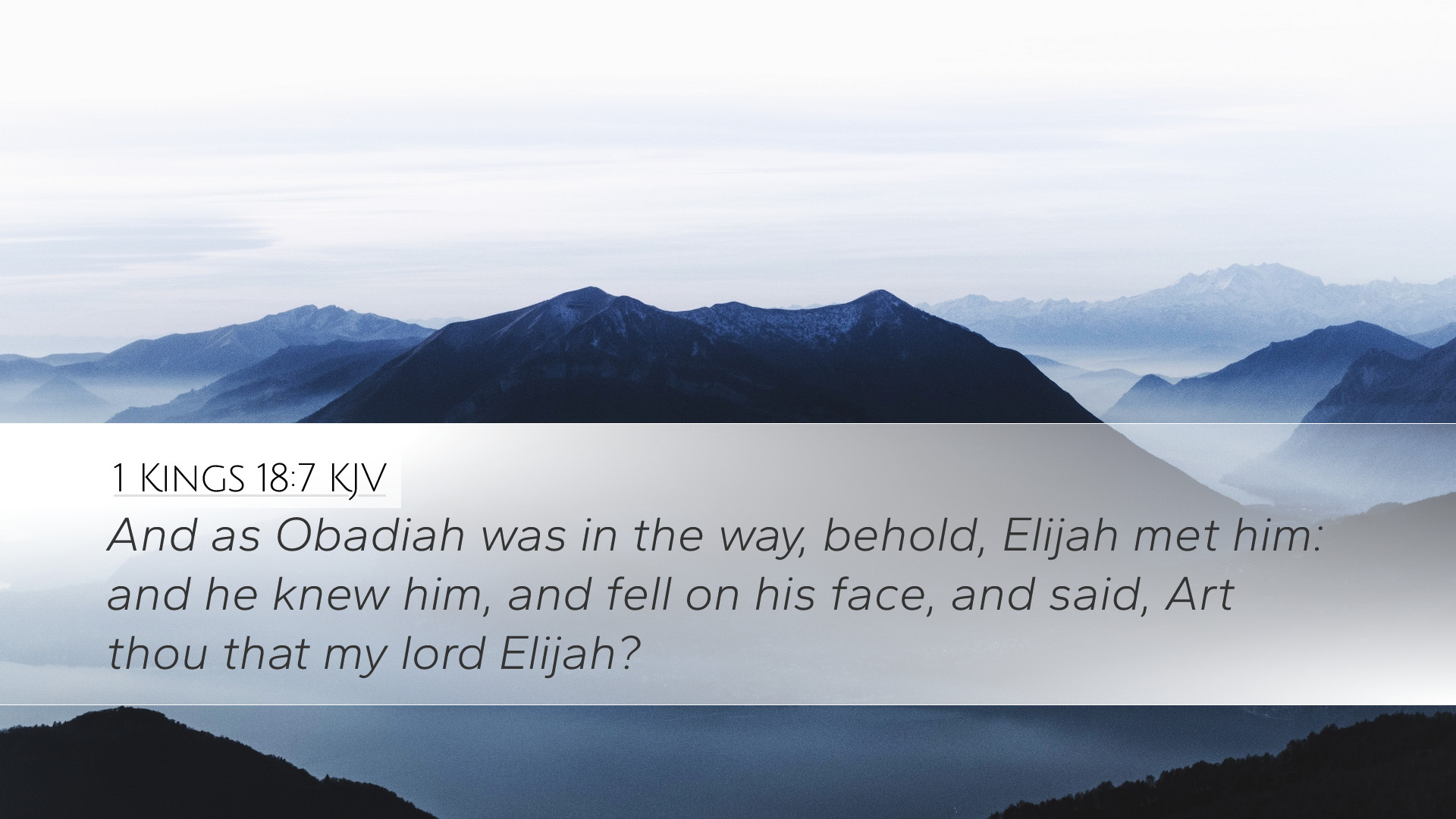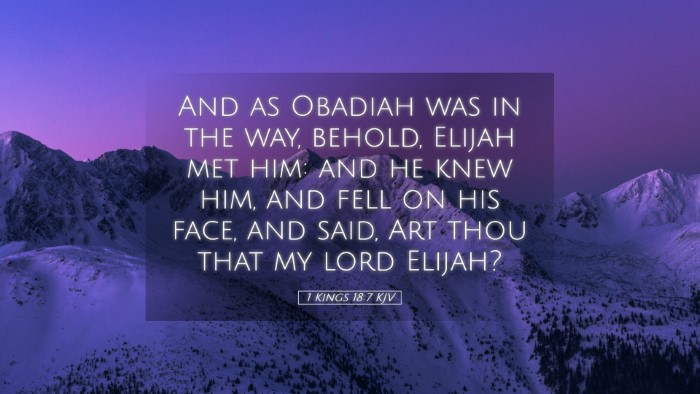Commentary on 1 Kings 18:7
Text of the Verse: "As Obadiah was on the way, behold, Elijah met him: and he knew him, and fell on his face, and said, Art thou that my lord Elijah?" (1 Kings 18:7, KJV)
Introduction
This verse marks a significant moment in the narrative of 1 Kings, where Elijah's mission begins to unfold amidst the backdrop of Israel's spiritual decline. We encounter Obadiah, a key figure whose role becomes pivotal in the dramatic confrontation between the prophet Elijah and the prophets of Baal. Commentaries by Matthew Henry, Albert Barnes, and Adam Clarke shed light on this encounter, emphasizing its theological and historical significance.
Contextual Background
1 Kings 18 occurs during a time of great apostasy in Israel. King Ahab's marriage to Jezebel had introduced the worship of Baal, leading Israel away from God. Elijah, as the prophet of the Lord, is sent to confront this idolatry. Obadiah, a servant of Ahab who secretly worshiped Yahweh, represents a remnant of faithful servants in a corrupt administration.
The Encounter with Obadiah
In this encounter, several themes emerge:
- Recognition and Respect: When Obadiah sees Elijah, he recognizes him immediately and shows great respect by falling on his face. This act signifies the high regard in which the prophets were held, particularly in a time of spiritual crisis.
- Faithful Service: Obadiah’s character is crucial in this narrative. He has been a faithful servant to Ahab, yet has endangered himself by protecting 100 prophets of the Lord from Jezebel’s purge.
- Divine Providence: The meeting underscores God’s providence in arranging the circumstances for Elijah’s return to confront Ahab.
Commentary Insights
1. Matthew Henry's Perspective
Matthew Henry emphasizes the gravity of Elijah's return. He notes that God orchestrates this meeting with Obadiah to prepare the landscape for Elijah's challenge to Baal. Henry highlights Obadiah's faithfulness in a treacherous environment: "Though he lived among the enemies of God, he served Him faithfully.” Henry draws attention to the contrast between Elijah’s boldness and Obadiah’s cautiousness, illustrating different forms of faith in action.
2. Albert Barnes' Examination
Albert Barnes provides a thorough exposition on the significance of the identity and authority of Elijah. He comments on the domestic and political situation, noting, "Obadiah's acknowledgment of Elijah illustrates the reverence for the prophet’s office." Barnes points out that Obadiah’s reaction involves genuine fear and awe, implying that true prophets carry the weight of their divine calling. The phrase "my lord Elijah" reflects not only respect but a recognition of Elijah’s prophetic authority.
3. Adam Clarke's Analysis
Adam Clarke delves into the socio-political implications of the encounter. He remarks on Obadiah's dual role as an officer in Ahab's court and a secret worshipper of Yahweh, suggesting that he illustrates the tension many believers face in hostile environments. Clarke notes that this encounter is pivotal in the narrative, establishing Elijah's mission to re-establish true worship in Israel. He further emphasizes the importance of Obadiah’s character, stating: "He feared the Lord greatly, and did not back down in the face of persecution.”
Theological Themes
This verse presents several important theological themes relevant to Christian life and ministry:
- The Cost of Faithfulness: Obadiah’s situation illustrates the complexities of living out faith in a secular environment, reflecting the challenges believers face today.
- God's Sovereignty: God’s orchestration of events demonstrates His control over history, affirming that He raises up prophets like Elijah at critical moments in human history.
- The Role of Prophets: Elijah’s boldness in confronting evil is a call to modern believers to stand firm in their faith and witness, regardless of societal pressures.
Conclusion
1 Kings 18:7 serves as a powerful reminder of God's providential care and the call to faithfulness amidst adversity. The insights from public domain commentaries provide depth and understanding to this critical moment in Israel's history. For pastors, students, and scholars, this passage underscores the relevance of the prophetic voice and the importance of maintaining faith in a world often at odds with God’s truth.


